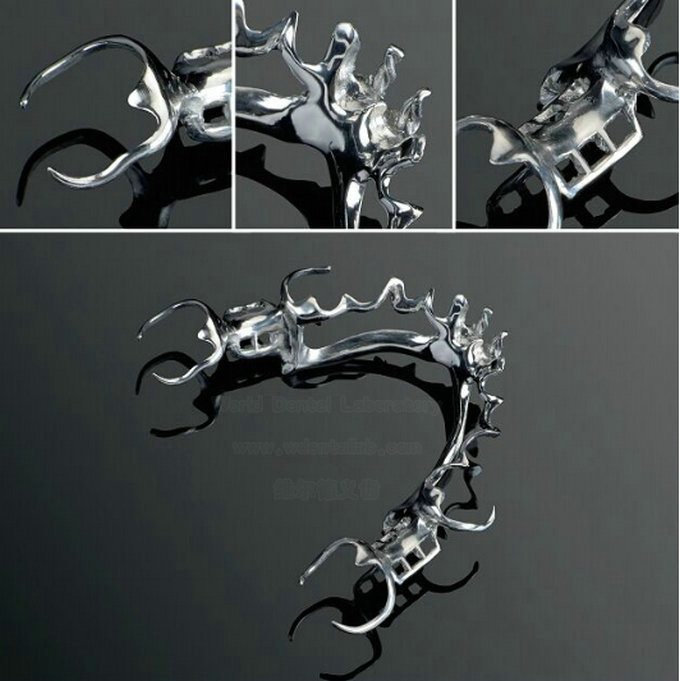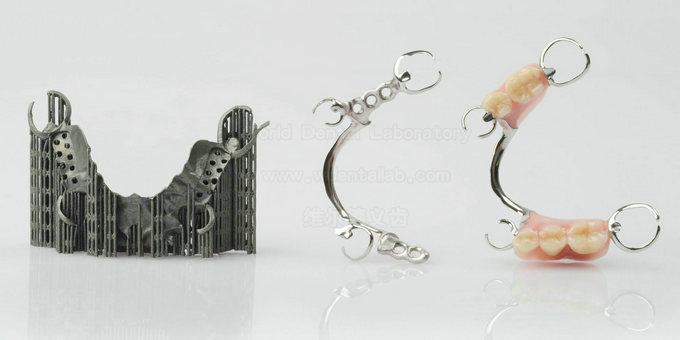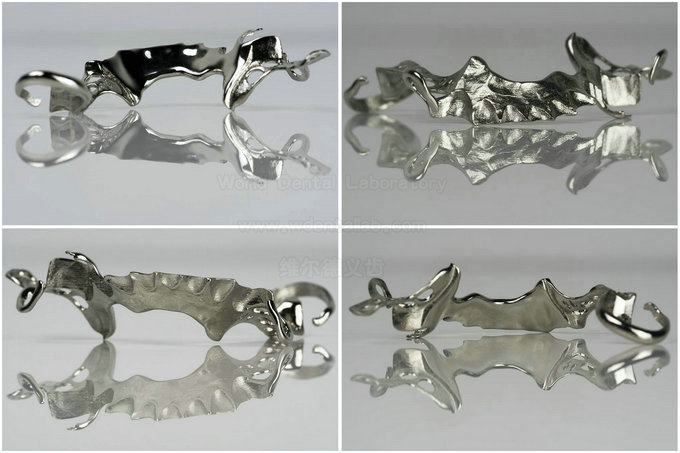A. ★ Bego Co-Cr Frameworks ★
B. ★ Bego Perfect Dentures ★
C. ★ Vitallium 2000 Co-Cr Frameworks ★
D. ★ Nobilium Co-Cr Frameworks ★

E. ★ CAD/CAM Pure Titanium Frameworks ★


F. ★ 3D SLM Co-Cr /Pure Ti. Frameworks ★



G. ★ Bredent BioHPP PEEK Frameworks ★

Four Type of Clasps: Metal Clasp, Clear Clasp, Dental D Clasp, Valplast Flexible Clasp
GUIDELINES FOR THE CARE AND MAINTENANCE OF DENTURES:
Based on the best available evidence, the following are guidelines for the care and maintenance of dentures:
1. Careful daily removal of the bacterial biofilm present in the oral cavity and on complete dentures is of paramount. Importance to minimize denture stomatitis and to help contribute to good oral and general health.
2. Dentures should be cleaned daily by soaking and brushing with an effective, nonabrasive denture cleanser.
3. Denture cleansers should only be used to clean dentures outside of the mouth.
4. Dentures should always be thoroughly rinsed after soaking and brushing with denture-cleansing solutions prior to reinsertion into the oral cavity. Always follow the product usage instructions.
5. Although the evidence is weak, dentures should be cleaned annually by a dentist or dental professional by using ultrasonic cleansers to minimize biofilm accumulation over time.
6. Dentures should never be placed in boiling water.
7. Dentures should not be soaked in sodium hypochlorite bleach, or in products containing sodium hypochlorite, for periods that exceed 10 minutes. Placement of dentures in sodium hypochlorite solutions for periods longer than 10 minutes may damage dentures.
8. Dentures should be stored immersed in water after cleaning, when not replaced in the oral cavity, to avoid warping.
9. Denture adhesives, when properly used, can improve the retention and stability of dentures and help seal out the accumulation of food particles beneath the dentures, even in well-fitting dentures.
10. In a quality-of-life study, patient ratings showed that denture adhesives may improve the denture wearer’s perceptions of retention, stability and quality of life; however, there is insufficient evidence that adhesives improve masticatory function.
11. Evidence regarding the effects of denture adhesives on the oral tissues when used for periods longer than six months is lacking. Thus, extended use of denture adhesives should not be considered without periodic assessment of denture quality and health of the supporting tissues by a dentist, prosthodontist or dental professional.
12. Improper use of zinc-containing denture adhesives may have adverse systemic effects. Therefore, as a precautionary measure, zinc-containing denture adhesives should be avoided.
13. Denture adhesive should be used only in sufficient quantities (three or four peasized dollops) on each denture to provide sufficient added retention and stability to the prostheses.
14. Denture adhesives should be completely removed from the prosthesis and the oral cavity on a daily basis.
15. If increasing amounts of adhesives are required to achieve the same level of denture retention, the patient should see a dentist or dental professional to evaluate
16. While existing studies provide conflicting results, it is not recommended that dentures be worn continuously (24 hours per day) in an effort to reduce or minimize denture stomatitis.
17. Patients who wear dentures should be checked annually by the dentist, prosthodontist or dental professional for maintenance of optimum denture fit and function, for evaluation for oral lesions and bone loss, and for assessment of oral health status.






